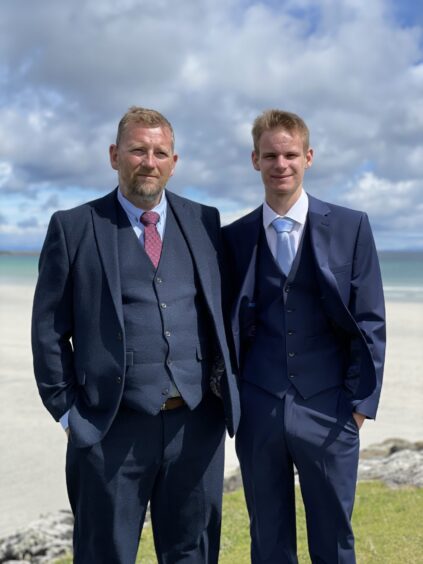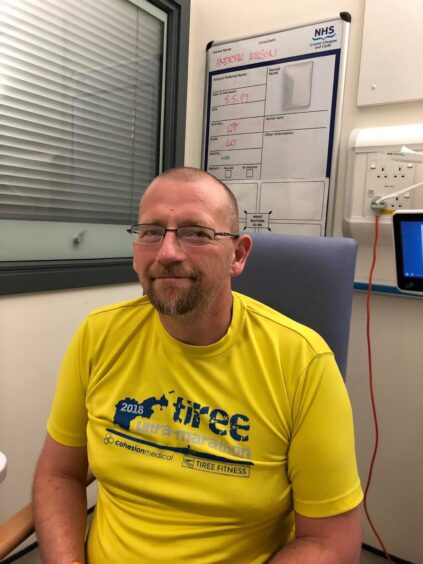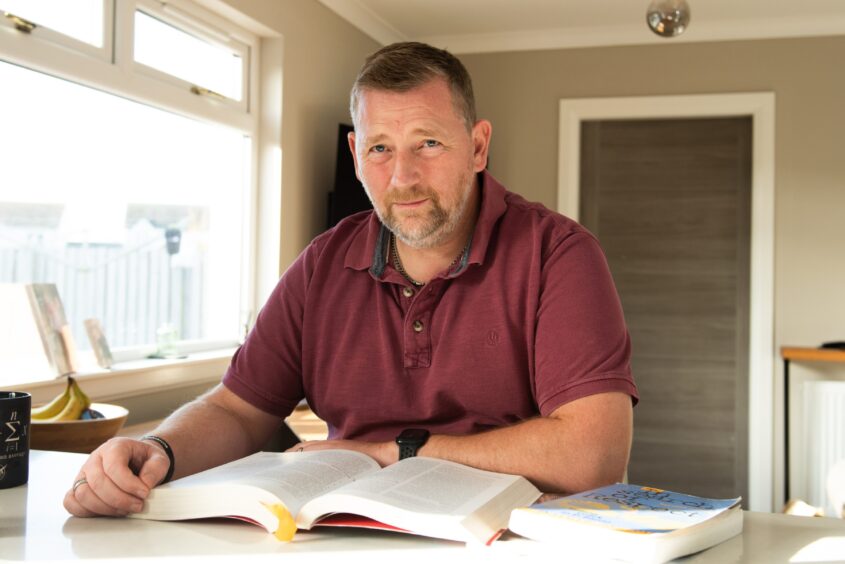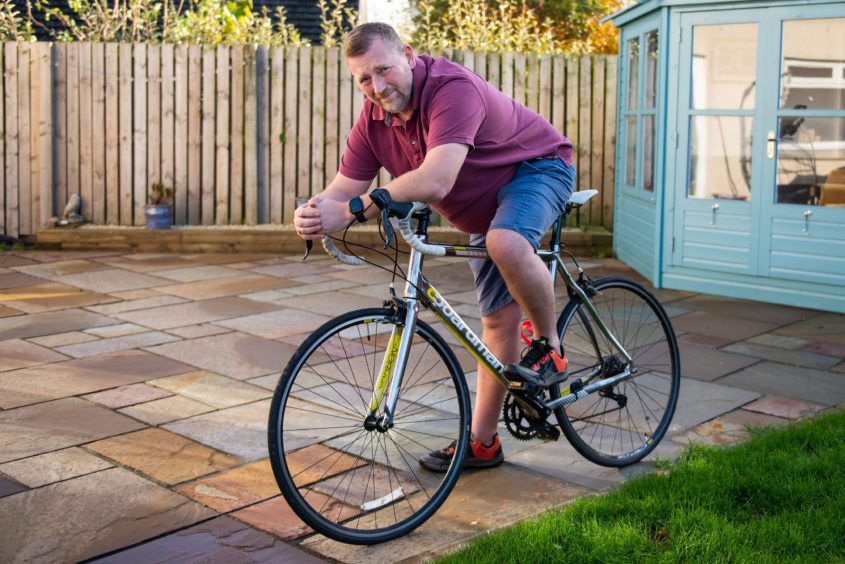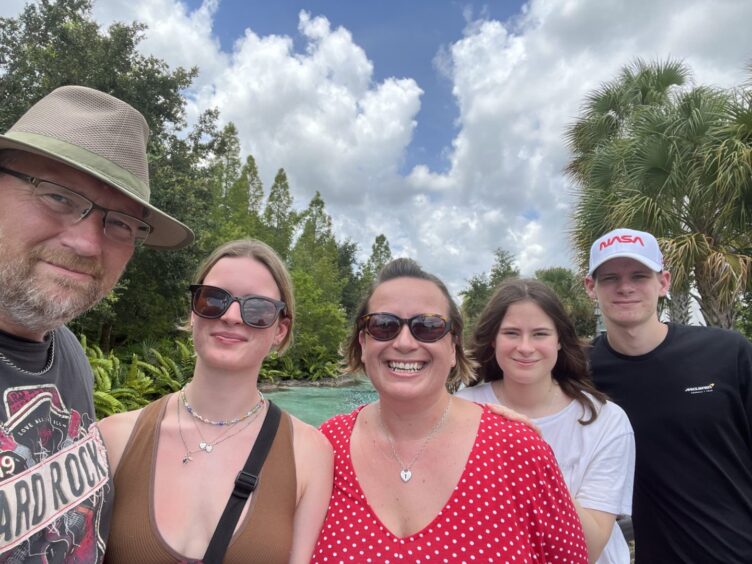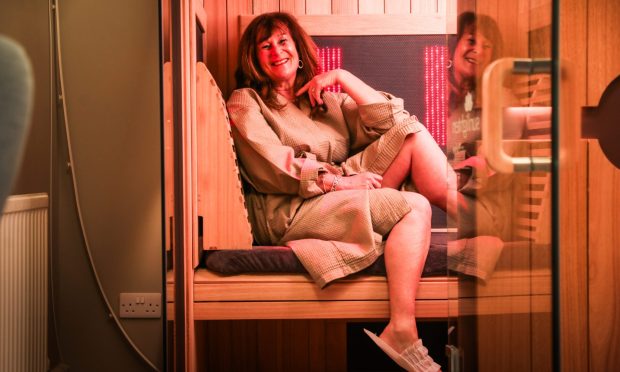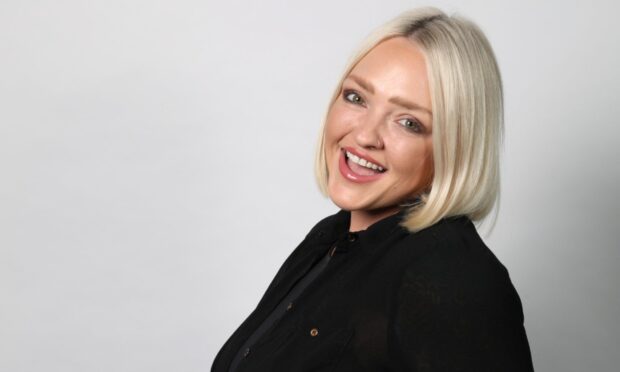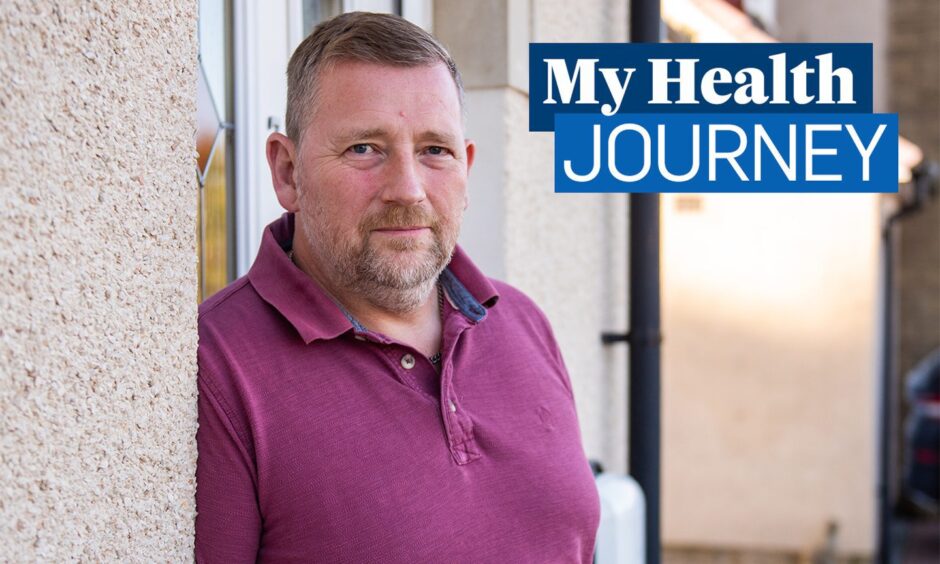
When Perthshire man Andy Wilson woke up during the night with neck pain while camping, he had no idea it was a symptom of a stroke.
The then 46-year-old police officer from Errol had been camping in Scarinish, on the inner Hebridean island of Tiree, with his 14-year-old son Jake.
The keen endurance athlete had travelled to the island in May 2019 to run a half marathon.
“After I had taken part, my son and I had spent some time cycling, visiting relatives and we were wild camping for the night,” Andy, 51, recalls.
“I woke up during the night with a pain in the back of my neck, but I just assumed it was because I had been lying in a funny way.
“I managed to ignore the pain and get back to sleep.
“However, the next morning I tried to get up but found I couldn’t. I couldn’t stand at all. Jake sort of pushed me out the tent. I couldn’t walk – we didn’t know what to do.”
Andy’s stroke diagnosis
Andy managed to call an ambulance while a local doctor also attended.
“The doctor took one look at me and then pushed me into her car,” he says.
“She felt it was better to go to the doctor’s surgery straight away rather than wait for the ambulance to arrive.”
The doctor carried out the FAST test – (Face, Arms, Speech, Time). First responders do this to identify whether someone is having a stroke. Andy then heard the doctor on the phone calling for an air ambulance.
They waited for around an hour before he was flown to the Queen Elizabeth Hospital in Glasgow where doctors immediately carried out CT scans.
They didn’t show any issue, leaving Andy with a severe migraine diagnosis. But that changed when a follow up MRI scan revealed Andy had experienced multiple strokes.
“I had no clue. I remember when I was young my gran in her late 70s had a stroke so as far as I was concerned a stroke was something that happened to older people,” he remembers now.
“It wasn’t something I thought would ever happen to me.”
Andy spent just a few days at Queen Elizabeth before being discharged and placed under the care of the stroke team at Perth Royal Infirmary.
But further tests identified Andy had two holes in his heart and that he also had an aortic aneurysm – a balloon-like bulge in his artery.
He had an operation to repair the two holes in his heart, but doctors judged work on the aneurysm to be too big a risk.
How did the stroke change Andy’s life?
The after-effects of the stroke have left a lasting impact on Andy – both mentally and physically.
Before the stroke, he had been very fit. He had completed 20 ultra marathons and was also a keen cyclist and swimmer.
But after the stroke he was left with a weakness in his left arm and leg that forced him to give up running.
“In the blink of an eye I went from being the breadwinner, the anchor in the family, to suddenly being completely dependent on others. My wife became my carer.
“I was unable to drive for 18 months after my stroke because I had sort of left side neglect.
“There was nothing wrong with my vision, but while I could see things on my left side, my brain wouldn’t register that they were obstacles, so I would walk into them.”
Andy’s wife Fiona, 51, took two months off work to look after him. She is now retired.
“She went from being my wife to my carer which isn’t what you sign up for and it’s hard, he remembers.
“It was hard her, on me and on our children as well – my oldest daughter, Molly, was 16 at the time and my youngest, Martha, was 12.”
The stroke forced Andy to take early retirement from the police. He says leaving a job he loved was a “difficult blow”.
Battling PTSD and depression after stroke
The psychological impact of the stroke hit Andy hard. Doctors diagnosed him with PTSD and depression.
“I was diagnosed because of the trauma of the brain injury. In the first year afterwards I would regularly wake up during the night to check I was ok.
“I also didn’t like being away from home.
“If we were staying in a hotel I would need to know where my mobile phone was. And I would need to know the hotel’s address in case I had to call an ambulance.
“It took a long time for me to get to a place where I wasn’t doing that.”
Andy also used to enjoy going on camping trips with his son, but now can’t as he is too frightened of history repeating itself.
He said: “I haven’t been able to go camping with my son since my stroke.
“We used to do that a lot but I don’t want to go now because I am scared of what might happen.”
Andy also experienced mood swings.
“I can go from being quite happy one minute to feeling really sad and tearful the next, for no obvious reason
“I would also sometimes be irritable with my family just through frustration at not being able to do certain things.”
Counselling helped Andy through the dark times
Andy still finds it difficult to talk about his stroke – but he has managed to find help and support through counselling.
Now Andy works with the Stroke Association to raise greater awareness among communities.
“I am grateful for the help I have had from healthcare professionals through my stroke journey.
“But I think the NHS is very much set up to only deal with the physical impacts of stroke. More needs to be done to help people with the psychological effects.
“I am fortunate as I was able to access counselling through my policing, but not everyone is able to access private mental health support.
“I wouldn’t like to think where I would be if I hadn’t had that.”
As well as having support for his mental health, Andy continues to exercise.
He cycles on his electric bike and attends local Pilates classes which have helped to build up his strength.
Stroke showed Perthshire dad family ‘most important thing in life’
To keep moving forward with a positive mindset, Andy believes it is important to set goals.
One of his is to complete a PhD in criminology from Abertay University, which he is currently studying.
“I think having the stroke made me realise what is most important in life. My family have always been important to me.
“But after what happened I realised just how much they do for me and how much I need and rely on them.
“Having their support has just been amazing.”
